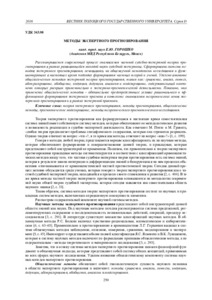Please use this identifier to cite or link to this item:
https://elib.psu.by/handle/123456789/17478Full metadata record
| DC Field | Value | Language |
|---|---|---|
| dc.contributor.author | Горошко, Е. Ю. | - |
| dc.date.accessioned | 2016-10-26T08:19:26Z | - |
| dc.date.available | 2016-10-26T08:19:26Z | - |
| dc.date.issued | 2016 | - |
| dc.identifier.citation | Вестник Полоцкого государственного университета. Серия D, Экономические и юридические науки. - 2016. - № 6. – С. 250-253. | ru_RU |
| dc.identifier.issn | 2070-1632 | - |
| dc.identifier.uri | https://elib.psu.by/handle/123456789/17478 | - |
| dc.description | Methods of Expert Forecasting | ru_RU |
| dc.description.abstract | Рассматривается современный процесс становления частной судебно-экспертной теории прогнозирования в рамках развивающейся молодой науки судебной экспертизы. Сформирована система методов экспертного прогнозирования, основываясь на общенаучной методологии исследования и функционирующих в настоящее время подходах формирования частных теорий и учений. Уделено внимание общелогическим методам экспертной теории прогнозирования, таким как: сравнение, анализ, синтез, абстрагирование, обобщение, индукция, дедукция, аналогия и моделирование, содержательный компонент которых раскрыт применительно к экспертно-прогностической деятельности. Показано, что применение общелогических методов – обязательное предопределяющее условие рационального и эффективного формирования экспертного прогноза в контексте становления теоретических основ экспертного прогнозирования и в рамках экспертной практики.= Modern process of formation of the private judicial and expert theory of forecasting within developing young science of judicial examination is considered. The system of methods of expert forecasting, based on general scientific methodology of research and approaches of formation of private theories functioning now and doctrines is created. The attention to general-logical methods of the expert theory of forecasting, such as is paid: comparison, the analysis, synthesis, abstraction, generalization, induction, deduction, analogy and the modeling, which substantial component it is opened in relation to expert and predictive activity. It is shown how application of general-logical methods is an indispensable predetermining condition of rational and effective formation of the expert forecast in a context of formation of theoretical bases of expert forecasting, and within expert practice. | ru_RU |
| dc.language.iso | ru | ru_RU |
| dc.publisher | Полоцкий государственный университет | ru_RU |
| dc.relation.ispartof | Веснік Полацкага дзяржаўнага ўніверсітэта. Серыя D, Эканамічныя і юрыдычныя навукі | be_BE |
| dc.relation.ispartof | Herald of Polotsk State University. Series D, Economics and law sciences | en_EN |
| dc.relation.ispartof | Вестник Полоцкого государственного университета. Серия D, Экономические и юридические науки | ru_RU |
| dc.relation.ispartofseries | Серия D, Экономические и юридические науки;2016. - № 6 | - |
| dc.rights | open access | ru_RU |
| dc.subject | теория экспертного прогнозирования | ru_RU |
| dc.subject | методы прогнозирования | ru_RU |
| dc.subject | общелогические методы | ru_RU |
| dc.subject | прогностическое моделирование | ru_RU |
| dc.subject | методы теоретического прогностического исследования | ru_RU |
| dc.subject | theory of expert forecasting | ru_RU |
| dc.subject | forecasting methods | ru_RU |
| dc.subject | general-logical methods | ru_RU |
| dc.subject | predictive modeling | ru_RU |
| dc.subject | methods of theoretical predictive research | ru_RU |
| dc.title | Методы экспертного прогнозирования | ru_RU |
| dc.type | Article | ru_RU |
| dc.identifier.udc | 343.98 | - |
| Appears in Collections: | 2016, № 6 | |
Files in This Item:
| File | Description | Size | Format | |
|---|---|---|---|---|
| 250-253.pdf | 141.76 kB | Adobe PDF |  View/Open |
Items in DSpace are protected by copyright, with all rights reserved, unless otherwise indicated.